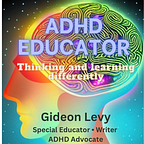Masking vs Authenticity — what do employers*really* want to see?
I had a very unique experience over this past week. I had the opportunity, for the first time in my professional career to come up with a list of accommodations for my ADHD.
To be fair, my first career track was working for my father (greatest case of undiagnosed ADHD I ever met) as a tour guide who could lean into ALL of my ADHD inclinations:
“Look at this! Look at that! Hey did you know this? Hey did you know that? Let’s walk a few miles and find out! This was great! I’ll probably never see you again! On to the next group!”
It left me pretty poorly prepared for the strict guidelines, byzantine bureaucracy, and sometimes hostile politics of the American public school system. In my first few years, I failed miserably at navigating these unfamiliar systems. I was also clueless as to how un-self-aware I was about some of my over-the-top behaviors that led to my failures. After a few years experience, a change in medication, and some MUCH needed therapy… I was STILL failing at meeting the neurotypical demands of being a public school teacher. Only this time I could see it happening… and like a slow-motion train wreck, still found myself unable to stop it.
There’s been a rising trend, and a commensurate backlash in professional circles recently: “Bring your whole self to work.”
Oh really, Bob? You want to see the Gideon who has pasta sauce stains on his shirt because he can’t eat pasta on his deep-seated couch while watching baking shows without spillage occurring between the plate and his mouth? How about the Gideon who cleans house in his underwear while dancing to Pat Benetar, or recites his favorite lines from Marvel TV shows while riding his bike hands-free so he can pantomime how he imagines the hand-to-hand-combat scenes should play out.
As much as employers say they want to see all the unique and fascinating sides to you, some of those sides just don’t belong in the workplace. Its something we convey to our students who, with they underdeveloped frontal lobes don’t always understand the necessity of showing a different face, different clothes, and a different vocabulary in school than they might with their friends on a Friday night. It’s a form of code-switching and its a necessary part of becoming an adult.
ADHD habits, however, aren’t a code or an appearance, it’s the intrinsic way that our brains are wired, which is why we call it masking. It’s something we can’t switch on or off, its something we’ve learned to hide. Some of us better than others.
So what if we didn’t have to hide? What if it were coded into our national disability discourse that ADHD is a real medically proven disability/condition that deserves to be accomodated in the workplace? Because legally, it is and employers need to recognize that.
So, when I was interviewing for a teaching job at a small private school that caters to students with mental/emotional disabilities and neurodivergences, the school director asked me for a list of reasonable accommodations for my condition. For the first time, I felt like I could lower my mask and show myself.
Well, sometimes I’ll stand up and stretch in the middle of a meeting to wake up my mind and body.
And that’s okay.
Sometimes I’ll space out and not hear something you said and ask for you to repeat it.
And that’s okay.
Sometimes its okay to admit your flaws to the people you report to, and sometimes it isn’t. But when your flaws are acknowledged, and accommodated, the loyalty and hard work that comes from an employee being seen for who they are can’t be overstated.
UPDATE: I got the job!!!!! :-D
